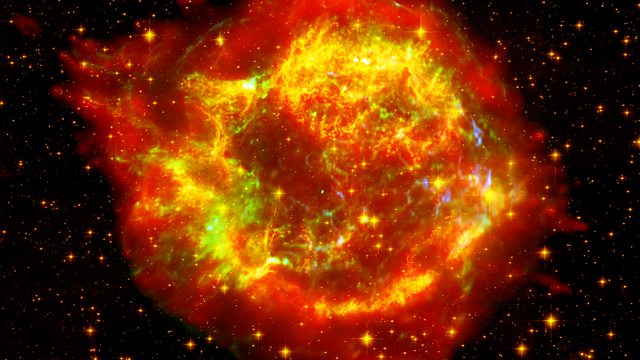The Death of Stars
Melvyn Bragg and guests discuss how so much in the Universe, and much of our understanding of it, depends on changes in stars as they die after millions or billions of stable years
Melvyn Bragg and guests discuss the abrupt transformation of stars after shining brightly for millions or billions of years, once they lack the fuel to counter the force of gravity. Those like our own star, the Sun, become red giants, expanding outwards and consuming nearby planets, only to collapse into dense white dwarves. The massive stars, up to fifty times the mass of the Sun, burst into supernovas, visible from Earth in daytime, and become incredibly dense neutron stars or black holes. In these moments of collapse, the intense heat and pressure can create all the known elements to form gases and dust which may eventually combine to form new stars, new planets and, as on Earth, new life.
The image above is of the supernova remnant Cassiopeia A, approximately 10,000 light years away, from a once massive star that died in a supernova explosion that was first seen from Earth in 1690
With
Martin Rees
Astronomer Royal, Fellow of Trinity College, Cambridge
Carolin Crawford
Emeritus Member of the Institute of Astronomy and Emeritus Fellow of Emmanuel College, University of Cambridge
And
Mark Sullivan
Professor of Astrophysics at the University of Southampton
Producer: Simon Tillotson
Last on
More episodes
Previous
Next
LINKS AND FURTHER READING
READING LIST
Mitchell Begelman and Martin Rees, Gravity's Fatal Attraction: Black Holes in the Universe (Cambridge University Press, 2009)
Jo Dunkley, Our Universe: An Astronomer's Guide (Pelican, 2020)
Or Graur, Supernova (MIT Press, 2022)
John Johnson, Zwicky: The Outcast Genius who Unmasked the Universe (Harvard University Press, 2019)
Andrew King, Stars: A Very Short Introduction (Oxford University Press, 2012)
Robert P. Kirshner, The Extravagant Universe: Exploding Stars, Dark Energy, and the Accelerating Cosmos (Princeton University Press, 2016)
Katie Mack, The End of Everything (Astrophysically Speaking) (Allen Lane, 2020)
Jacqueline Mitton and Simon Mitton, Vera Rubin: A Life (Belknap Press, 2021)
Carl Sagan, Cosmos: The Story of Cosmic Evolution, Science and Civilisation (Little, Brown, 1983)
RELATED LINKS
Broadcasts
- Thu 9 Jun 2022 09:0091热爆 Radio 4
- Thu 9 Jun 2022 21:3091热爆 Radio 4
Featured in...
![]()
Science—In Our Time
Scientific principles, theory, and the role of key figures in the advancement of science.
In Our Time podcasts
Download programmes from the huge In Our Time archive.
The In Our Time Listeners' Top 10
If you鈥檙e new to In Our Time, this is a good place to start.
Arts and Ideas podcast
Download the best of Radio 3's Free Thinking programme.
Podcast
-
![]()
In Our Time
Melvyn Bragg and guests discuss the ideas, people and events that have shaped our world.



